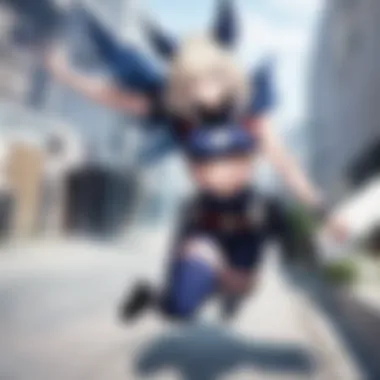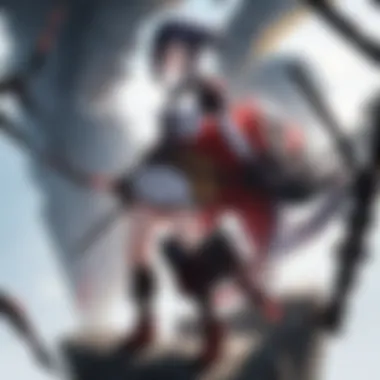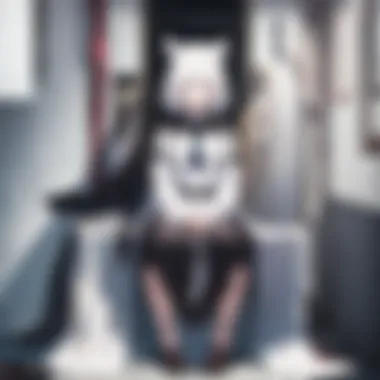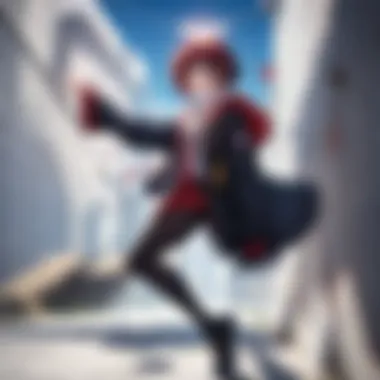Unveiling the Enigmatic Realm of My Hero Academia: A Dive into its Characters and Plotlines


Introduction to the Series
My Hero Academia, an animemanga series that has captivated audiences worldwide, offers a compelling narrative filled with unique characters, intense plotlines, and profound thematic elements. Since its debut in [release date], this series has garnered immense popularity and critical acclaim, setting itself apart in the realm of anime and manga.
Staff and Cast Details
Delving into the creative force behind My Hero Academia, one encounters a pool of talented individuals. From directors to animators, each member of the staff brings a distinctive touch to the series. The cast list features renowned voice actors who breathe life into the characters, making them resonate with the audience. Behind-the-scenes, the production team works tirelessly to craft each episode with precision and dedication, contributing significantly to the success of the series.
Theme Music Analysis
The theme music of My Hero Academia plays a vital role in setting the tone for each episode. Composed by [composer's name] and performed by [musician's name], the opening and ending theme songs add layers of emotion and depth to the series. Analyzing the thematic elements within the music provides further insight into the overarching narrative, enhancing the audience's connection to the storyline.
Plot Summary and Analysis
A comprehensive overview of the plot in My Hero Academia unveils a tapestry of intricate story arcs and character developments. From the emergence of new villains to the growth of aspiring heroes, each episode unfolds with suspense and intensity. Analyzing the plot twists, themes, and motifs reveals the depth of storytelling present in the series, showcasing the creativity and vision of the creators.
Reception and Impact
The reception of My Hero Academia has been overwhelmingly positive, with critics praising its compelling narrative and dynamic characters. Fans have embraced the series, lauding its cultural impact and lasting legacy in the realm of anime and manga. A comparison with other similar series illuminates My Hero Academia's significance within the genre, solidifying its position as a standout creation in the world of animation.
Introduction
In delving into the compelling universe of My Hero Academia, one is confronted with a multifaceted world brimming with unique characters, intricate plotlines, and thought-provoking themes. This anime series has garnered substantial acclaim for its ability to encapsulate moral dilemmas within a fast-paced and action-packed narrative. Within the following sections, we will embark on a journey through the various dimensions of My Hero Academia, exploring its evolution, characters, plot intricacies, critical reception, and speculations for the future.
Brief Overview of My Hero Academia
Background and Setting
The backdrop against which My Hero Academia unfolds is a society where individuals wield superhuman abilities known as Quirks. This fundamental characteristic forms the bedrock of the series' narrative structure, offering a unique lens through which to explore themes of heroism, identity, and societal expectations. The choice of a world where Quirks are prevalent infuses the storyline with dynamism, allowing for the development of diverse characters and engaging plot twists. While this setting provides depth and complexity to the narrative, it also presents challenges in maintaining a balance between character-driven storytelling and action sequences.
Premise and Themes
At the crux of My Hero Academia lies a premise that follows the journey of Izuku Midoriya, a Quirkless individual aspiring to become a hero in a society where Quirks define one's worth. This underdog story arc resonates strongly with audiences, tapping into universal themes of perseverance, self-discovery, and the pursuit of one's dreams against all odds. The thematic richness of heroism, friendship, and rivalry imbues the series with emotional depth, fostering connections between characters and inviting viewers to reflect on their own values and aspirations. While the premise sets a solid foundation for character development and plot progression, it also entails the challenge of maintaining narrative coherence and thematic consistency.


Evolution of the Series
Season - Origins
Season 1 of My Hero Academia serves as the genesis of protagonist Izuku Midoriya's journey towards becoming a hero. It establishes crucial character dynamics, introduces the core concept of Quirks, and sets the stage for future conflicts and alliances. The season expertly balances character exposition with world-building, laying a strong foundation for subsequent narrative arcs. However, the heavy focus on Midoriya's growth may overshadow secondary character development, posing a narrative challenge in terms of balancing individual character arcs within the broader storyline.
Season - Rise of Villains
The second season of My Hero Academia witnesses the emergence of formidable antagonistic forces, providing a stark contrast to the hero-centric narrative of the first season. As the villains rise in prominence and pose a tangible threat to the established hero order, the series delves into moral gray areas and explores the complexities of power dynamics. Season 2 excels in its portrayal of antagonist motivations and the moral dilemmas faced by both heroes and villains, adding layers of intrigue and depth to the storyline. However, the proliferation of characters and subplots in this season may lead to narrative convolution and audience fatigue if not carefully managed.
Season - Provisional Hero License Exam
Season 3 of My Hero Academia introduces the Provisional Hero License Exam arc, wherein aspiring heroes undergo rigorous challenges to prove their readiness for real-world heroism. This season explores themes of perseverance, teamwork, and the consequences of failure, pushing characters to their limits and forcing them to confront their weaknesses. The intense action sequences and emotional stakes in this arc contribute to the overall tension of the series, keeping viewers on the edge of their seats. However, balancing character development with high-stakes action can prove challenging, as the narrative risk of sidelining character growth in favor of plot momentum looms large.
Season - Internship Arc
Season 4 of My Hero Academia delves into the Internship Arc, wherein students are thrust into real-world hero agencies to gain practical experience and hone their skills. This arc deepens the exploration of hero society dynamics, complicating the distinction between heroism and vigilantism. The complexity of ethical dilemmas and internal conflicts faced by characters in this arc adds layers of moral ambiguity to the series, challenging traditional notions of heroism and villainy. While this arc provides a rich tapestry of character interactions and narrative depth, the proliferation of new characters and subplots may overwhelm viewers and dilute the impact of individual character arcs if not handled with precision.
Character Analysis
Character analysis holds a crucial role in this in-depth exploration of 'My Hero Academia.' It serves as the backbone, providing insights into the intricacies of each character's development, motivations, and impact on the series. By dissecting the protagonists and antagonists, we can grasp the depth of storytelling and thematic elements woven into the narrative.
Protagonists
Izuku Midoriya (Deku)
In the spotlight of 'My Hero Academia', Izuku Midoriya (Deku) shines as the epitome of resilience and growth. His journey from being quirkless to inheriting One For All showcases the series' central theme of heroism transcending limitations. Deku's unwavering determination and selflessness set him apart, making him a relatable and inspirational character for viewers. The evolution of Deku's character embodies the essence of heroism and the sacrifices that come with pursuing one's ideals.
Katsuki Bakugo
Katsuki Bakugo, with his explosive personality and fierce ambition, offers a contrasting viewpoint to Izuku Midoriya. His complex rivalry with Deku adds layers to the narrative, depicting the nuances of friendship, competition, and personal growth. Bakugo's growth from a brash and hot-headed character to a more nuanced hero-in-training reflects the series' emphasis on character development and redemption.
Shoto Todoroki


Shoto Todoroki brings a compelling dynamic to the protagonist lineup with his divided heritage and inner turmoil. His mastery of both ice and fire quirks symbolizes his internal struggle between embracing his full potential and confronting his past. Todoroki's character arc delves into themes of family, identity, and personal agency, making him a fan favorite for his depth and complexity.
Antagonists
Tomura Shigaraki
Tomura Shigaraki embodies the antithesis of heroism, representing the dark side of society grappling with power and resentment. As the leader of the League of Villains, his chaotic nature and tragic past add layers to his character, offering insights into the consequences of neglect and misunderstanding. Shigaraki's nihilistic worldview challenges the traditional hero narrative, creating a compelling antagonist that drives the series' tension and thematic exploration.
All For One
All For One stands as the ultimate villain in 'My Hero Academia,' a symbol of power and manipulation. His ability to steal quirks and orchestrate intricate schemes poses a formidable threat to the heroes and society as a whole. All For One's presence underlines the moral ambiguity present in the series, questioning the boundaries between good and evil and the sacrifices made in the name of justice. As a catalyst for conflict and introspection, All For One exemplifies the deeper philosophical dilemmas at the core of 'My Hero Academia.'
Plot Analysis and Themes
In this exploration of My Hero Academia, understanding the intricate plotlines and thematic undercurrents is paramount to appreciating the depth of this anime series. The intricate weaving of narratives and the moral dilemmas presented in each arc add layers of complexity that resonate with audiences. By dissecting the plot analysis and themes, viewers can immerse themselves in the world of heroes and villains, examining the societal nuances and ethical conundrums portrayed.
Heroism and Society
Symbolism of Quirks:
Delving into the symbolism of quirks within My Hero Academia reveals a profound exploration of individuality and societal integration. Quirks symbolize unique characteristics and abilities that define each character, reflecting the diversity and dynamics of society itself. The choice to imbue quirks with symbolic meaning enriches the narrative, providing depth and intrigue to character development and interactions. This thematic element serves as a lens through which societal norms and prejudices are scrutinized, offering a fresh perspective on inclusivity and acceptance within the hero world.
Exploration of Hero Ideals:
The exploration of hero ideals in My Hero Academia delves into the essence of heroism and the moral complexities that accompany it. By dissecting the motivations and struggles of heroes in upholding justice and serving the greater good, the series challenges traditional hero tropes and delves into the grey areas of morality. This exploration adds a layer of psychological depth to the characters, making them relatable and multifaceted. The depiction of hero ideals not as straightforward concepts but as evolving principles infuses the series with philosophical undertones, prompting viewers to reflect on their own belief systems and values.
Friendship and Rivalry
Dynamics Between Characters:
Examining the dynamics between characters in My Hero Academia unveils the intricacies of relationships forged in the face of adversity. The series masterfully portrays the evolution of friendships, from initial rivalries to profound bonds built on trust and mutual respect. Each interaction between characters is laced with underlying tensions and unwavering support, reflecting the complexities of real-life connections. The depth of character dynamics enhances the emotional resonance of the narrative, drawing audiences into the web of interpersonal complexities and growth.
Resolving Conflicts:


The theme of resolving conflicts permeates My Hero Academia, highlighting the importance of communication, empathy, and compromise in overcoming obstacles. The series showcases various conflict resolution strategies, ranging from peaceful negotiations to intense confrontations, each revealing different facets of character development and moral integrity. By portraying conflicts as opportunities for growth and understanding, My Hero Academia emphasizes the significance of resolving differences through dialogue and mutual understanding. This thematic exploration adds depth to the storyline, fostering character progression and illustrating the power of reconciliation in forging unbreakable bonds.
Critical Reception and Impact
In the realm of 'My Hero Academia', the critical reception and impact hold immense significance. This section delves into the reception of the series in critical circles and the broader impact it has had on the anime landscape. Reviewers and viewers alike have lauded the series for its compelling storytelling, well-developed characters, and exploration of complex themes. The critical acclaim surrounding 'My Hero Academia' has elevated it to the upper echelons of the anime genre, garnering widespread recognition for its ability to captivate audiences and provoke thought. Understanding the critical reception and impact of the series is essential to appreciate its enduring popularity and cultural relevance.
Popularity and Fanbase
Cultural Phenomenon
The cultural phenomenon that 'My Hero Academia' embodies is a key aspect of its widespread popularity and fervent fanbase. This section explores how the series has transcended traditional anime boundaries to become a global sensation. 'My Hero Academia' has resonated with audiences due to its universal themes of heroism, friendship, and perseverance. Its ability to appeal to a diverse range of viewers, regardless of age or background, speaks to its status as a cultural touchstone. The unique blend of action, humor, and heartfelt moments has solidified 'My Hero Academia' as a cultural phenomenon that continues to captivate fans worldwide. Despite its immense popularity, the series also faces scrutiny for its commercial success and potential impact on the anime industry at large.
Merchandise and Spin-Offs
Examining the merchandise and spin-offs related to 'My Hero Academia' provides insight into the series' commercial success and extended universe. The robust merchandise line, including apparel, toys, and collectibles, speaks to the dedicated fanbase that eagerly consumes all things 'My Hero Academia'. Spin-off materials such as video games, novels, and side stories contribute to the immersive world-building that enhances the overall fan experience. While the abundance of merchandise and spin-offs can enrich the fandom's engagement with the series, it also raises questions about commercialization and the balance between artistic integrity and profits.
Critical Acclaim
Awards and Recognitions
The awards and recognitions bestowed upon 'My Hero Academia' underscore its impact on the anime landscape and entertainment industry. This section delves into the accolades received by the series, highlighting its achievements in storytelling, animation, and character development. Awards such as 'Best Anime Series' or 'Outstanding Animation' validate the creative vision behind 'My Hero Academia' and emphasize its contribution to popular culture. Recognition from esteemed organizations and industry professionals solidifies the series' reputation as a standout within the anime medium.
Criticism and Controversies
Despite its acclaim, 'My Hero Academia' is not without its share of criticism and controversies. This section addresses the debates and discussions sparked by certain storylines, character decisions, or thematic elements within the series. Criticisms range from pacing issues in specific arcs to character development choices that divide opinion among fans. Controversies surrounding representation, power dynamics, and cultural appropriation also prompt critical reflection on how 'My Hero Academia' navigates sensitive topics. Acknowledging the criticisms and controversies surrounding the series sheds light on its complexities and opens avenues for constructive dialogue within the fan community and beyond.
Future Prospects and Speculations
In the realm of anime enthusiasts and My Hero Academia fans, delving into the Future Prospects and Speculations of the series holds paramount importance. It serves as a compass guiding followers towards upcoming seasons and developments, fueling anticipation and fervor for what lies ahead. By dissecting possible character arcs and unresolved plot threads, fans engage in critical thinking and analytical discussions, enriching their viewing experience. The exploration of Future Prospects and Speculations hones viewers' ability to predict narrative trajectories, adding a layer of intellectual engagement to the entertainment value of the series. This section acts as a playground for avid fans to theorize, speculate, and immerse themselves in the imaginative tapestry of My Hero Academia.
Upcoming Seasons and Developments
Predictions for Character Arcs
Predictions for Character Arcs within My Hero Academia are a vital aspect that drives curiosity and excitement within the fanbase. As viewers closely follow the growth and progression of beloved characters like Izuku Midoriya, Katsuki Bakugo, and Shoto Todoroki, theorizing about their future paths becomes a tantalizing endeavor. Delving into the intricacies of their personalities, relationships, and past experiences, fans craft elaborate scenarios and developments that could shape the characters' journeys ahead. This exercise not only reflects the in-depth investment fans have in the series but also showcases their keen insights into character dynamics and narrative possibilities. Predictions for Character Arcs create a dynamic dialogue among fans, igniting debates, analyses, and creative exchanges that elevate the My Hero Academia viewing experience.
Unresolved Plot Threads
Unresolved Plot Threads serve as narrative hooks that captivate viewers and keep them eagerly awaiting future episodes. Within My Hero Academia, these lingering storylines add layers of complexity and intrigue to the overarching plot, leaving fans speculating and theorizing about potential resolutions. Whether it's mysteries surrounding the origin of quirks, enigmatic character backgrounds, or unresolved conflicts between heroes and villains, these plot threads contribute to the series' depth and longevity. They foster a sense of curiosity and speculation within the fan community, driving discussions, fan theories, and anticipation for how the narrative will unfold. By leaving strands untied, My Hero Academia masterfully maintains audience engagement and investment, ensuring that each new development is met with excitement and scrutiny.















